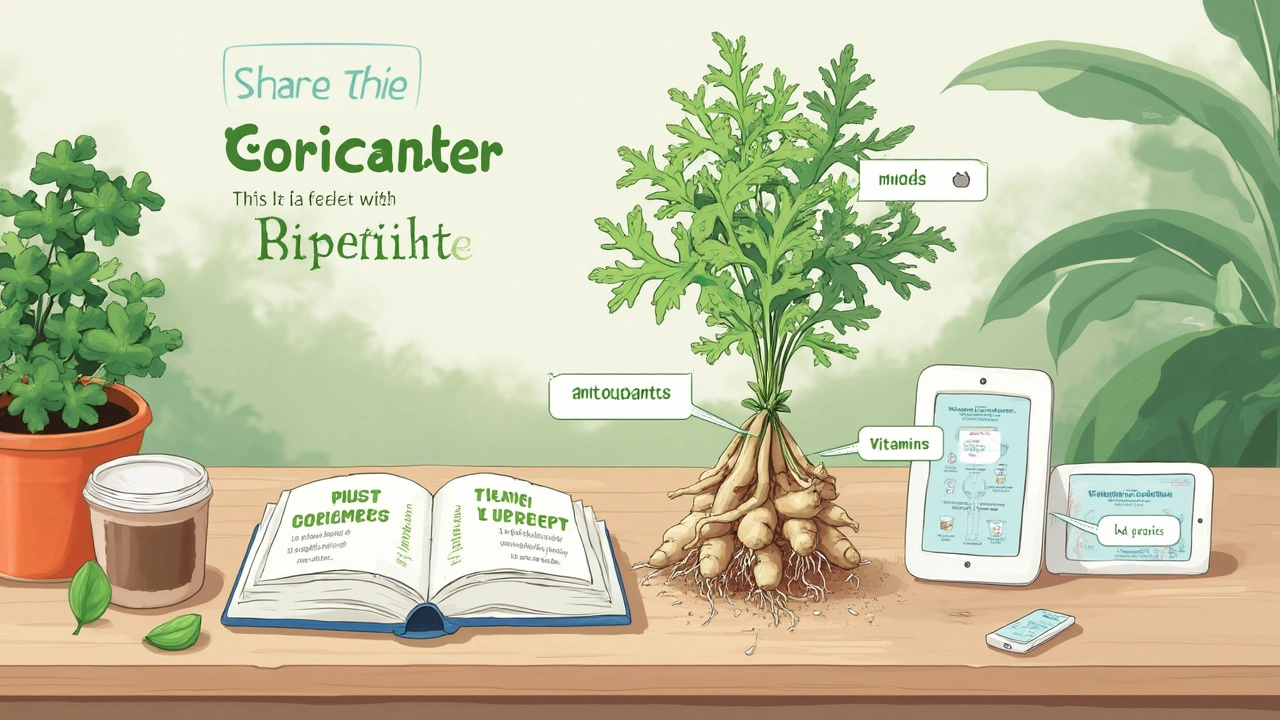Think coriander is just a decorative sprinkle on your curry? Guess again. This humble herb, often divided by people who love it or… well, can’t stand the taste, is hiding a health rap sheet that would make a nutritionist do a double take. Sitting quietly in your pantry or fridge, coriander (aka cilantro in the Americas) is delivering some next-level support for your body that most Aussies never tap into. Nutritionists in Sydney rave about it, but the rest of us? We’re throwing away the stems or barely using the leaves. Time for an upgrade—coriander deserves a starring role.
Why Coriander Packs a Punch in the Kitchen and Beyond
Let’s kick off with the science. Coriander leaves and seeds are loaded with essential nutrients—think vitamin C, vitamin K, vitamin A, calcium, magnesium, and even small amounts of potassium. While you won’t hit all your vitamin goals from a few sprigs, coriander is surprisingly dense compared to other herbs. But the real kicker? Antioxidants. Studies from reputable sources like the Journal of Food Science reveal that coriander contains unique antioxidants, including quercetin, kaempferol, and tocopherols. These compounds help your body fight oxidative stress and keep those rogue free radicals in check, lowering your risk of chronic issues like heart disease and certain cancers. Ever wondered why so many traditional healing systems, from Ayurveda to Traditional Chinese Medicine, rate coriander so highly? Turns out, those old-school herbalists were onto something—this green herb is more than flavor; it’s a tiny shield against everyday stressors.
Coriander isn’t just a modern supplement trend, either. Archaeologists have found coriander seeds in digs that date back to ancient Egypt, and the Romans chucked it into bread dough as a preservative. Why? Coriander oil has proven antifungal and antibacterial properties. If you’ve ever had a dodgy stomach after takeaway, you might appreciate coriander’s natural knack for soothing the gut. There are experiments showing coriander extracts could help fight foodborne pathogens like Salmonella. For Aussie families, where BBQ season is basically an annual event, adding coriander isn’t just for freshness—it’s a smart move for food safety, too.
It’s not just the science, either. People report that adding coriander to their diets reduces symptoms of mild digestive discomfort. Even though studies are ongoing, some research points to coriander’s ability to relax digestive muscles and reduce bloat. Not magic, just plant power. Below, check out a handy table spotlighting a few key nutrients and properties in coriander per 100g—just so you can see what you’re actually eating.
| Nutrient/Compound | Amount per 100g |
|---|---|
| Vitamin C | 27 mg |
| Vitamin K | 310 mcg |
| Potassium | 521 mg |
| Antioxidants (e.g., quercetin) | Rich |
| Dietary fiber | 2.8 g |
| Protein | 2.1 g |
Pretty impressive for a handful of leaves, right? That’s why coriander is shaking off its ‘just a filler’ label. Nutrition-forward cooks in Sydney are even blending the roots into pestos and sauces, making sure nothing gets wasted. And if you hate the taste? Science has your back. A specific gene, OR6A2, can make coriander taste like soap to about 14% of people. If you’re in that crew, coriander seed (which tastes warmer and citrusy) might still be your ticket to the benefits, without that soapy kick.
Coriander in Daily Life: Beyond the Garnish
Coriander isn’t just for chefs or health nuts with a Vitamix. You can easily add it to your daily grind. If you’re used to tossing the leaves on a curry or salad and calling it a day, consider this: coriander goes everywhere, from breakfast omelettes to smoothie bowls. Not all herbs have this much flexibility, but coriander leaf stays bright whether you use it raw or stir it in at the last minute of cooking. If you’re feeling adventurous, coriander works in places you wouldn’t expect—think grain bowls, homemade hummus, or even sprinkled into guacamole. Got leftover stems? Don’t bin them; chop and toss them into stocks or blend into salsas for a supercharged green hit.
But it’s coriander seed that’s long been a behind-the-scenes hero. These little brown orbs pack a sweet, slightly spicy punch and sneak their way into all sorts of Aussie spice blends, from dukkah to curry powders. Toast them dry in a pan for 1-2 minutes and you’ll notice a huge shift in flavor—nutty, warm, and nothing like the leaves. A quick tip for home cooks in Sydney: grind toasted coriander seeds and add to roast veggies, marinades, or even in a pinch of homemade bread dough. The flavor boost is unreal, and it’s a sneaky way to get more antioxidants without diving into a supplement bottle.
Let’s talk storage. Sadly, coriander has a bit of a reputation for wilting if you so much as look at it wrong. To keep it fresh, treat it like you would fresh flowers: stick the roots in a glass of water, cover the leaves loosely with a plastic bag, and keep it in the fridge. This hack can mean an extra week of crisp, perky coriander leaves vs sad, soggy bunches headed for the bin.
Maybe you’ve heard coriander credited with helping detox heavy metals from the body. There’s some research, especially from animal studies, showing coriander might bind to certain metals like lead and mercury, making them easier for your system to flush out. While you shouldn’t skip medical treatment for heavy metal exposure, adding coriander to your diet can be an easy ‘why not?’—just one more natural layer of support.
If you want to get the most out of coriander’s health benefits, try pairing it with dishes high in healthy fats—like avocado toast or salmon salads. Many of the antioxidants in coriander are fat-soluble, so your body absorbs them better this way.

Coriander as a Dietary Supplement: Should You Go Beyond the Plate?
With supermarkets in Sydney now offering coriander capsules, tinctures, and dried powders, you might wonder if popping a supplement is better than fresh. Here’s the scoop: fresh coriander offers all the natural compounds in synergy, learning from thousands of years of cultural use. Supplements can standardize the dose, sure, but they don’t always deliver the broad matrix of plant goodies you get from real leaves or seeds. Still, supplement forms might be handy for busy people, or for those who travel a lot and can’t always access fresh produce.
If you’re considering going the supplement route, here’s what to check:
- Look for brands that provide third-party quality testing.
- Choose products that use both coriander leaves and seeds, to get the widest profile of nutrients.
- Avoid products with a ton of fillers or vague ingredient lists.
Now, can you overdo it on coriander? If you’re chugging down coriander oil or super-dosed supplements, maybe. Some people react with mild allergies—think itchy skin, or mild stomach upset. As with anything new, start small and see how your body feels. If you’re on blood thinners or take medication for blood pressure, have a word with your GP—coriander has been lightly shown to influence both, though the effect is usually mild.
Some actual numbers: In studies where participants consumed 100–200 ml/day of coriander leaf juice, mild drops in blood sugar, improved cholesterol numbers, and reduced inflammation markers were seen over a few weeks. Not a miracle, but certainly worth considering if you’re chasing natural improvements in your day-to-day health. Coriander seed supplements have also been trialled for irritable bowel syndrome (IBS), with some pilot trials from Indian researchers showing real improvements in symptoms compared to a placebo. The caveat? Regular, everyday use matters more than one-off doses or mega-doses after a junk food binge.
Pregnant women or those breastfeeding should steer clear of mega doses or essential oils, though—the safety data just isn’t there yet. But the odd sprinkling of fresh leaves or handful of seeds? No worries.
The bottom line for most of us: real food is still king. Adding a bunch of fresh coriander to your lunch, or grinding seeds over homemade soups, isn’t just tasty—it’s efficient. Supplements can fill in gaps, but don’t rely on them solely unless you have a medical need.
Putting Coriander Power to Work: Practical Tips and Recipes
Ready to level up? It’s easy, and you don’t have to be a MasterChef regular to pull it off. Bringing more coriander into your life is about setting a habit. Here’s a quick checklist that will get you started:
- Add a handful of chopped coriander leaves to salads, tacos, curries, or even scrambled eggs at the end of cooking to keep the flavor fresh and vibrant.
- For a super easy dip, blend coriander with Greek yogurt, lemon juice, and a touch of garlic. It will keep things interesting at your next BBQ.
- Throw coriander stems into your next batch of homemade stock or soup. They’ll break down during simmering and add loads of flavor.
- Toast coriander seeds in a dry skillet, crush them, and add to roasted veggie trays, salad dressings, or spice rubs for meat and fish.
- If you’re into smoothies, blend a quarter cup of leaves into a green detox mix for a bright, herby note and that antioxidant hit.
- Feeling creative? Try coriander root in Thai-style pestos or stir-fries—just scrub, chop, and blitz it up with fresh garlic, nuts, and a squeeze of lime juice.
Turn the tables in your kitchen with this Green Goddess Coriander Sauce—great on everything from grilled chicken to roasted cauliflower:
- 1 large bunch coriander leaves and stems, washed
- 1 garlic clove
- Half a green chili (optional, for heat)
- Juice of 1 lime
- 1/4 cup olive oil
- Pinch of salt
Throw everything in a blender, whizz, and slather. Your weeknight dinners will never feel boring again.
Maybe you’re after inspo from around the world? In Mexico, people blend coriander into salsas and soups for brightness. Indian cuisine leans into both leaves and seeds—think coriander chutney served with samosas, or seeds toasted and ground into spice mixes. Thai cooks toss coriander roots into curry pastes for depth, while in the Middle East, fresh leaves bring zing to tabbouleh.
Even people who dislike the flavor can usually find a method that works. If you’re on the fence, try pairing coriander with citrusy flavors (like lime or lemon) and creamy textures (think avocado, yogurt) to balance out any harsh notes.
Want the fast facts on boosting coriander’s impact in your daily diet? Here’s a handy summary:
- Pair with healthy fats for better absorption.
- Use both leaves and seeds for broadest benefits.
- Fresh is best, but quality dried seeds work well where fresh leaves aren’t available.
- Add at the end of cooking to protect sensitive vitamins and keep flavors fresh.
No more seeing coriander as a throwaway garnish. Instead, treat it as a secret weapon. The next time you shop, grab an extra bunch. The science, the tradition, and the taste—everything’s pointing the same way. Give it a fair go, and you might find your new favorite kitchen hero.





Whoa!!! I can't believe how much power coriander packs!!! 🤯 I mean, seriously, who knew that this little green herb hiding on your plate has such amazing health benefits???
I've always been suspicious about these "superfood" claims, but this article actually breaks down the science behind coriander's antioxidants and blood sugar benefits. Like, does it really work that well? Also, why isn’t anyone shouting from the rooftops about this? Feels like a conspiracy that this magical herb isn’t more popular!!!
Honestly, I’m gonna start adding coriander to absolutely everything I eat. Salads, soups, even my morning toast if I have to. 😂
Who else is with me on this coriander takeover plan? And is there a chance it could interact with any meds? I've gotta be cautious because you never know with supplements these days!!!
Anyway, thanks for opening my eyes to this little green powerhouse! We might be on to something HUGE here!!!
This is such a wonderful share!💚 Coriander really is a gem and it’s great seeing its benefits being recognized more widely.
What I love about it is how easy it is to incorporate into meals—whether in fresh salads, smoothies, or even just sprinkled over cooked dishes. It truly feels like a simple step towards better health.
Also, the digestive health benefits mentioned here are so important; many folks overlook how herbs can support our gut naturally.
If anyone’s looking for ways to add it in, I’d be happy to suggest some easy recipes that bring out coriander’s flavors without overpowering your meals.
Let’s encourage each other to make small but meaningful diet changes every day! 🌱
Oh yes, the ever mysterious coriander, the salad garnish that might actually save your life. How delightful.
It’s fascinating how something we all thought was just a decoration has now been unmasked as this health powerhouse. I wonder why it took so long for science to catch up with what grandma’s kitchen already knew.
Still, I’m somewhat skeptical of the 'lower blood sugar' claim. Are we talking marginal effects or clinically relevant ones? Because if you’re relying on coriander alone to manage serious conditions, let me know how that works out.
It's refreshing to see facts laid out here with practical tips, but let’s keep some perspective, shall we?
Really, another herb hyped up as a miracle cure? Honestly, I find it a bit exhausting how every other week some common kitchen ingredient is touted as the next big health breakthrough.
Coriander may have some vitamins and antioxidants, sure, but relying on it to 'lower blood sugar' or 'reduce inflammation' seems a stretch without substantial evidence.
I’d suggest focusing on overall balanced nutrition and not putting too much faith in any single herb.
Also, our taste buds don’t all appreciate coriander, and pushing everyone to eat it might be a step too far.
Ah yes, coriander—mother nature’s little riddle wrapped in green. Love how the article explores both ancient wisdom and modern science. Quite the combo!
I’ve often found that coriander’s flavor can be divisive—some people love it, others find it, well... soap-flavored.
Personally, I see it as a cultural ambassador, bringing heat to curries and freshness to salsas while quietly doing its health work in the background.
Would anyone care to share their favorite coriander recipe? I’m always on the lookout for new ways to enjoy it that don’t overwhelm the palate.
As someone who’s recently turned to using more herbs for their health benefits, this post really caught my eye.
I find coriander versatile and refreshing in so many dishes, and knowing it might help with digestion and inflammation just seals the deal for me.
I do wonder about the best ways to store coriander to keep those nutrients intact, though.
Does anyone have tips for preserving its freshness and maximizing its health potential?
Would love to hear your thoughts!
From an aggressive standpoint, not using coriander regularly in your diet is missing out BIG time!!!
In India, coriander is a staple, and its powerful medicinal properties have been celebrated for centuries, not just recently discovered.
If anyone doubts its importance, I challenge them to look into Ayurvedic texts and traditional remedies where coriander is central.
Its ability to reduce inflammation and manage blood sugar is not just anecdotal—it’s backed by generations of observational evidence.
So jump on this bandwagon now. Your health will thank you later.
Seriously, don't sleep on coriander!
What an enlightening article! The precise mechanisms by which coriander contributes to metabolic health deserve more attention, for sure.
In my experience, incorporating such herbs into diet is a gentle yet effective approach to wellness.
It would be interesting to see more controlled clinical studies quantifying its impact on blood glucose parameters and inflammatory markers in diverse populations.
Additionally, the synergistic effect of coriander with other dietary components could open new pathways for nutritional science.
Looking forward to future research in this field with rigorous methodology.
This is a critical read for anyone interested in natural supplements. Caution must be exercised when interpreting claims about herbs like coriander.
Though promising, the evidence needs to be robust, and consumers should not abandon proven medical treatments in favor of herbs alone.
Moreover, different individuals may respond variably, so personalized guidance from healthcare professionals is advisable.
Let’s appreciate coriander’s benefits, yes, but also maintain scientific rigor and pragmatism.
I really appreciate the balanced perspective the article provides—it neither overhypes nor dismisses coriander's benefits.
In my experience advising people on inclusive health improvements, small lifestyle changes like adding herbs can build toward significant wellness gains.
Besides the health edge, coriander adds vibrant flavor which encourages people to enjoy their meals more, possibly improving diet adherence overall.
Does anyone have input on how coriander could fit into culturally diverse diets without clashing with traditional tastes?
Sharing ideas might help everyone expand their culinary horizons.
It's quite fascinating to read about coriander's health benefits. In my region, we primarily use it for cooking, unaware of its deeper health potentials.
This article encourages me to explore more knowledge about our local herbs and their medicinal roles.
Could anyone recommend reliable resources or studies focusing on coriander and other herbs employed in African cuisine?
I believe there's much we could learn that bridges traditional use with modern science.
Looking forward to a rich discussion!